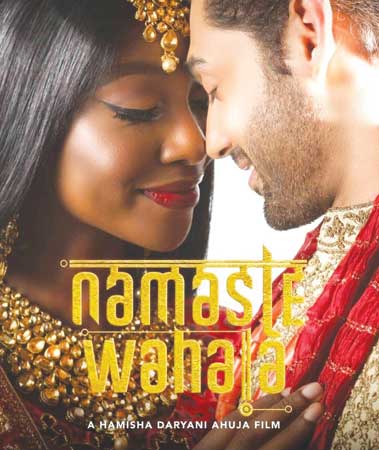

Gioia Forster & Anne-Sophie Gall -
As far as romcoms go, “Namaste Wahala” has the typical elements: Boy meets girl, they fall in love, they face a test of their friendship, and then everything works out in the end.
But “Namaste Wahala” is also a love story between two billion-dollar film industries from separate continents: Nollywood and Bollywood.
“I grew up in an Indian family in Nigeria. I am in the perfect position to tell this story of these two cultures,” Hamisha Daryani Ahuja tells dpa. The director, producer and actress’ debut film tells the love story of Didi, a woman from Nigeria, and Raj, from India.
When their families find out, the pair, played by Ini Dima Okojie and Ruslaan Mumtaz, is forced to deal with misunderstandings, cultural differences and critical soon-to-be in-laws. “In the film, there is a lot of magic, romance and cheese but also many real topics we touch on. There are deep-rooted issues that do come up,” says Ahuja.
But it’s not all serious: The Netflix release takes a humorous, celebratory look at the cultures of India and Nigeria — and reveals many common preferences and traditions, not least for fancy weddings.
Family prejudice is first and foremost.
Didi’s relatives don’t want her to marry an Indian, and Raj’s family don’t want him to marry a Nigerian — reflecting reality in many ways.
Most Nigerians and Indians look for a spouse within their culture.
In India, people usually marry within the same caste and social class. In Nigeria, too, nationality, ethnic origin and religion all matter when it comes to choosing a life partner. And in both cultures, family opinion matters a great deal in whom you choose.
That is slowly changing, however, particularly with the increased mixing of cultures.
Both Nigeria and India were once British colonies, and Indian families have been based in Nigeria for generations — including Ahuja’s family. Some 50,000 Indians live in Nigeria, according to the Indian diplomatic mission. Many stay within their community, although love stories similar to Didi and Raj’s do happen, Ahuja says.
“Namaste Wahala” — which translates roughly as “Hello Trouble” — turns the differences between the two cultures into comedy. “But actually the differences are the biggest similarities,” Ahuja says.
Both cultures share a love of food, fashion and music. Family and respect for the older generation is very important in both. “And both cultures love big parties.”
Indian weddings, in particular, are known as lavish celebrations that can last for several days. Often, hundreds of guests are invited — even if the bride and groom don’t know many of them.
Nigerian weddings are also big and glamorous. “This is a very essential part of the culture,” says Sandra Adewale, a wedding planner in Lagos. “We believe in having everybody coming to share in the joy.” People sometimes show up even if they’re not invited. “You can have 1,000 people at your wedding you didn’t even plan for.”
Ahuja says she created the film for Nigerian audiences.
“Nigeria grew up on a Bollywood diet,” she says. Indian movies and TV shows are dubbed for Nigerian television and in movie theaters.
Ahuja says wanted to make a film that Nigerians could relate to, but with a “Bollywood feel.” “That is why this movie is receiving so much buzz. Because people in Nigeria love and relate to both cultures.”
Thanks to Netflix, the film is now getting worldwide attention.
“Wouldn’t surprise me if Namaste Wahala ends up being one of Netflix’s biggest film releases,” one observer wrote on Twitter. “Bollywood and Nollywood have HUGE film industries, both originate from cultures obsessed with weddings and both have massive populations both in-country and in the diaspora.”
Ahuja didn’t expect the film to generate such interest worldwide — and says she feels deeply touched. “Many people have written to me and said, ‘I feel seen,’” she says.
All over the world, the issue of cross-cultural love, and the difficulties that come with it, seems to have appeal — not just in India and Nigeria. “They are so excited to see a love story that is so diverse on the biggest movie platform in the world,” Ahuja says. — dpa
Oman Observer is now on the WhatsApp channel. Click here



